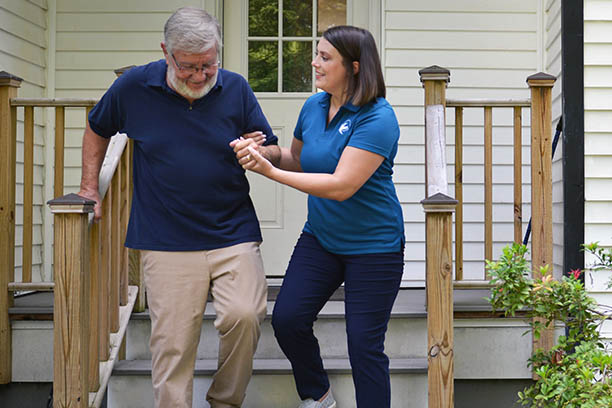
Caring For Someone with Alzheimer's
Did you know that as many as 5.1 million Americans may have Alzheimer's disease? That number is provided by the Alzheimer’s Foundation of America. Alzheimer's disease is a fatal brain disease that, among other things, causes a slow decline in memory, thinking and reasoning skills. If your loved one has received a diagnosis of Alzheimer’s disease, you may be frightened and devastated; however, we would like to provide some ideas to make the journey easier.
There is no cure for Alzheimer's disease; however, symptoms can be reduced with different treatments and therapies. Medical professionals can treat these symptoms; thus improving the quality of life for those suffering from Alzheimer's Disease.
What Are 10 Warning Signs of Alzheimer’s Disease?
- Loss of memory of daily routines: not remembering recent events, people's names, where things are in the home or where they belong, and other new information that is not able to be recalled.
- Difficulties in problem solving and planning: Having trouble following a familiar daily routine or keeping track of normal monthly bills, having difficulty thinking and concentrating and taking more time than normal when doing routine things.
- Familiar tasks are more difficult, i.e., walking the dog.
- Time and place is more confusing: People with Alzheimer’s can lose track of dates, holidays, seasons and time like what year or day it is.
- Images, distances and space are more confusing: look for difficulty reading books or newspapers, judging the distance of something familiar or figuring out color and contrast.
- Speaking and writing have become confusing or more difficult: Signs include new trouble finding the right words, finishing a sentence and following simple directions or conversations.
- Keeping track of belongings and/or finding belongings: Does your loved one suddenly put things in abnormal places or accuse others of stealing.
- Decisions have become more difficult: There may be issues with falling for scams or maybe a reduced interest in grooming and hygiene.
- Social and work activities have become less interesting or have stopped.
- Mood swings and personality changes: Signs include possible increased depression, new fearfulness, anxiety or suspicion, and rapid and new mood swings.
If you have noticed any of these symptoms in your loved one, please have them screened by a physician for Alzheimer's disease. What may be a surprise is that Alzheimer's disease is not part of the aging process; it is not the same as forgetfulness.
Alzheimer's Support is the Most Important Resource
If your loved one is diagnosed with Alzheimer's disease, the more decisive and proactive you are from the very beginning, the bigger the difference you can make in their quality of life and can also help manage the disease. If your loved one is diagnosed with Alzheimer's, here are a few basic things you can do to help.
- Discover information and become educated regarding Alzheimer's. Two resources that may be of value are: The Alzheimer’s Foundation of America and the Alzheimer’s Association.
- Don't delay making long-term estate and health plans. Discuss and prepare for future care and end-of-life matters.
- Keep your brain active. Listen to enjoyable music, complete word puzzles or play a game. These activities can be enjoyable and mentally stimulating for someone with Alzheimer's and can provide enjoyment for family and caregivers.
- Take a break. Even if you are providing full-time care for your loved one with Alzheimer's disease, you will need help. Introducing a professional caregiver while a person is still in the early stages of Alzheimer’s is much easier than changing a routine as the disease progresses. At Visiting Angels of Liberty Lake, we train our caregivers in memory difficulty assistance and suggest someone with professional experience be part of the long-term care plan for anyone with Alzheimer's disease.
- Have a support system. Being the caregiver for someone with Alzheimer’s is often stressful and overwhelming. Keep yourself mentally and physically healthy, with a support system in place. Ensuring your own mental and physical health will help you be the best caregiver possible. Reach out to your local hospital and other departments on aging. They often offer free support groups. Check out sites like the National Family Caregivers Association. These contacts often offer resources to help assist caregivers.
If you or your loved one has been diagnosed with Alzheimer’s or a related memory disorder, please get in touch with us and know you are not alone. To learn more:
Serving Liberty Lake, Mead, Colbert, Deer Park & Surrounding Areas
Visiting Angels LIBERTY LAKE WA
23801 E Appleway #120Liberty Lake, WA 99019
Phone: 509-903-4000
IHS.FS.61468298


